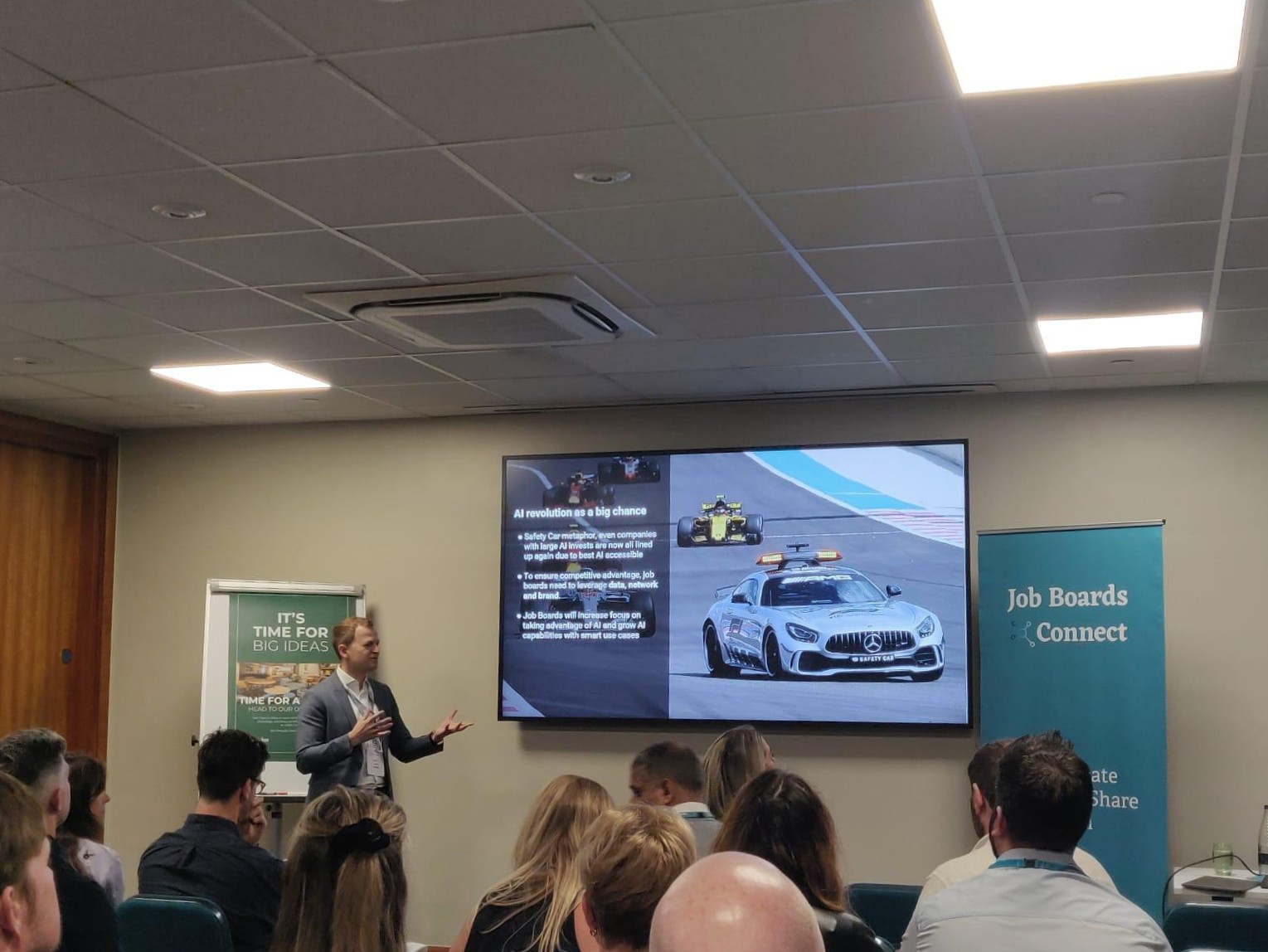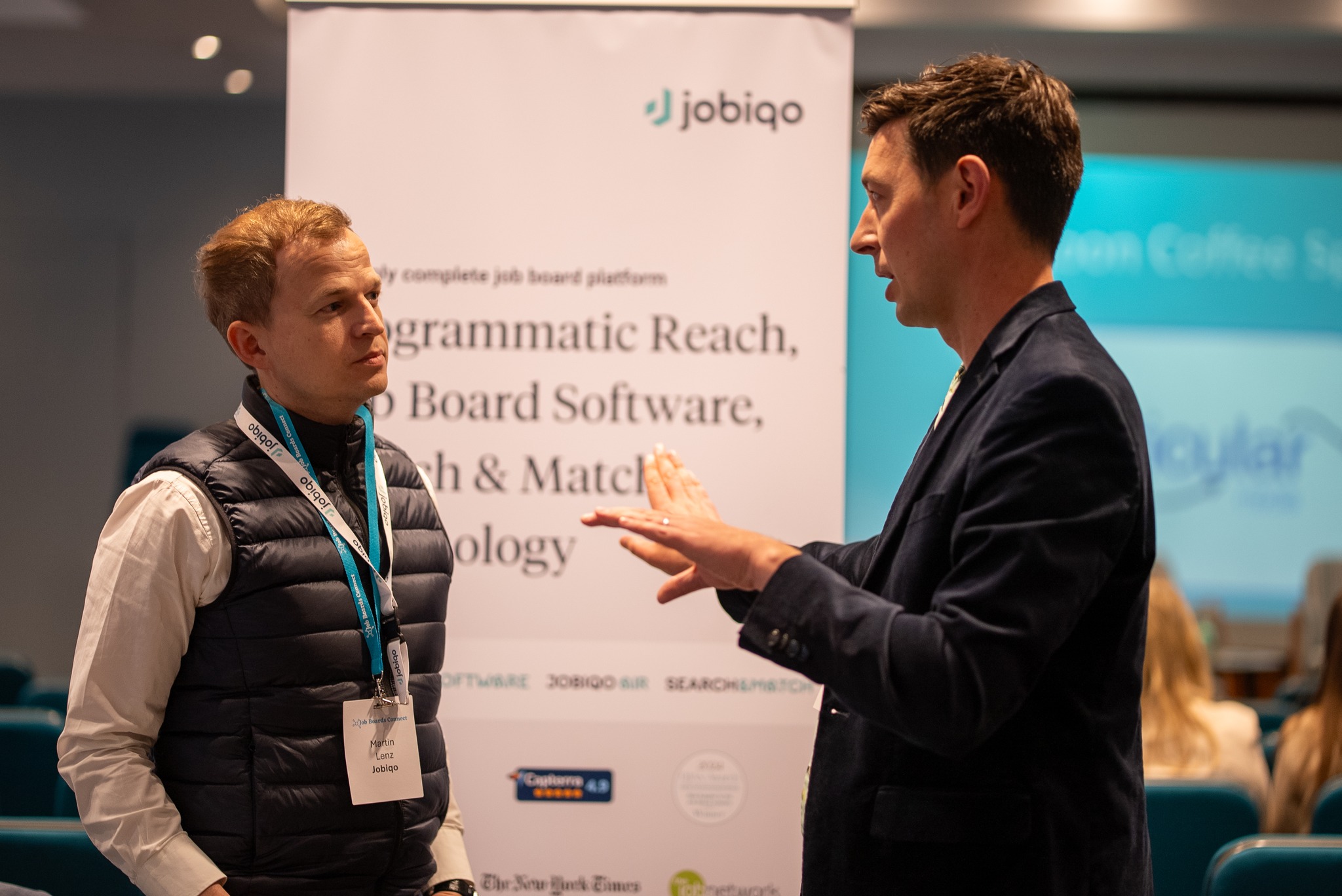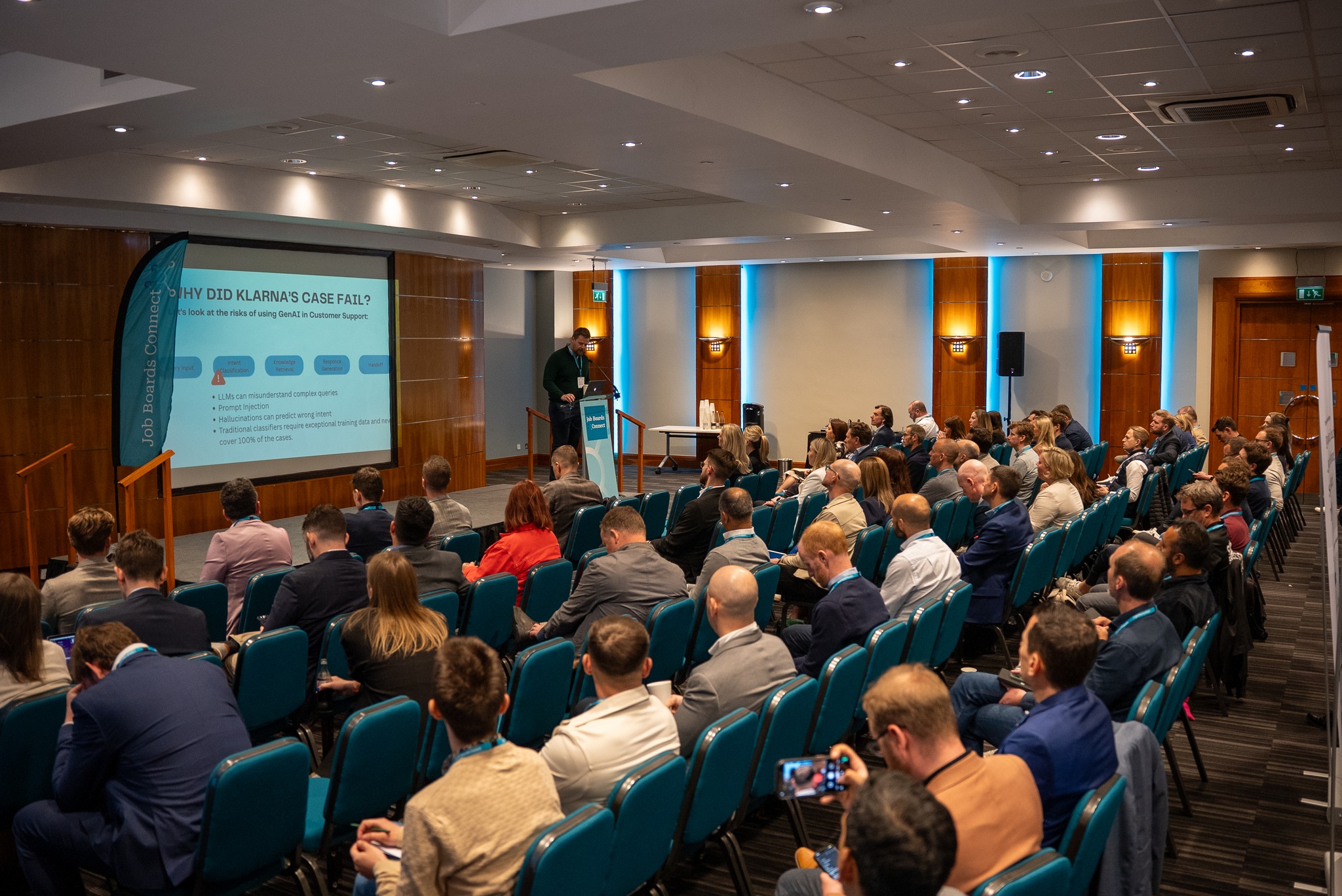Job Boards Connect Unplugged 2025 – Highlights from London

London hosted one of the most well-known gatherings in the recruitment advertising space, Job Boards Connect Unplugged 2025, on May 15th.
The event was more than a traditional conference; it was a genuine meeting of minds, bringing together job board founders, technologists, marketers, and industry veterans for an honest conversation about where the job board sector stands now and, more importantly, where it is headed next.
What set this Job Boards Connect Unplugged apart wasn’t just the hype around Artificial Intelligence or the speaker line-up. It was the attendees’ openness to discussing difficult questions and sharing current pain points. Attendees also debated threats and opportunities waiting on the horizon, and in this article, we are pointing out some of the most important ones.
A safety car moment – How AI has hit reset on the whole industry
Our CEO Martin Lenz delivered the phrase that seemed to stick with everyone present:
“AI and changing user behaviours are reshaping how job seekers find, trust, and engage with job boards.”
In a breakout session alongside Lou Goodman (former VP B2B Marketing at Monster / CareerBuilder), Martin leaned into an unusual but powerful analogy for the impact of artificial intelligence on the job board sector.
He explained that we’re living through a “Safety Car” moment, drawing on car racing jargon: “The AI boom is a reset moment, like a safety car in racing. Even companies with major AI investments are now lining up again as powerful tools become widely accessible to all job boards.”
The metaphor resonated with the audience.

Jobiqo CEO Martin Lenz sharing the Safety car metaphor at Job Boards Connect Unplugged 2025
In racing, introducing a safety car doesn’t just slow everyone down; it also bunches up the field, erasing previous gaps and giving every competitor, regardless of their earlier lead, a new chance at victory. Likewise, in recruitment tech, the rapid democratisation of AI tools has levelled the playing field.
When it comes to AI innovation, both giants and smaller companies now face off side by side, with access to similarly powerful digital tools and data processing capabilities.
Martin Lenz made it clear: the days of gaining a lasting edge through proprietary AI alone are over. The field is being reset. It’s what job boards and their leaders do now, with data, networks, and branding, that will truly make the difference in the future.
The real differentiators: data, networks, and brand
Both Martin Lenz and Lou Goodman drove home the point that getting ahead today isn’t about chasing one tech buzzword after another. A true and lasting competitive advantage will stem from harnessing three timeless pillars:
-
Smart data usage,
-
Deep networks and relationships,
-
A bold, memorable brand.
But brand, as the conversation underscored, is so much more than a logo, a font, or a colour scheme. “A brand is more than how you look. It represents the collective perception of your company, shaped by your values, tone of voice, visual identity, and the experiences you deliver. It’s how you live in people’s minds.”
What makes a job board memorable nowadays? Beyond credible design, it’s about delivering on the promise of value at every touchpoint:
-
clear communication with candidates,
-
transparency to clients,
-
high-quality job matches,
-
consistent user experiences, both on desktop and mobile.
Arguably, in a fast-changing industry, the brand increasingly becomes the most important anchor. It’s the reputation that job boards build over time.
And at the foundation of the brand lies actionable, high-quality data.
If job boards can’t use the candidate and clients’ insights, they will struggle to deliver unique value that keeps users (and advertisers) coming back.
The social media and Gen Z impact
One of the most interesting insights was this: “Gen Zs spend 54% more time on social platforms than average.”
Younger generations have fundamentally different expectations when it comes to job search. They aren’t just visiting job boards and submitting CVs; they’re looking for opportunities on TikTok, on Instagram, and evaluating employer reputations from viral posts and interactions.
While social media has been a disruptor for quite some time in other industries, now it takes centre stage in recruitment advertising as well.
Social platforms are no longer secondary channels. For many job seekers, especially digital natives, they’re the primary way to discover, research, and apply to new jobs.
As social media platforms like Facebook, Instagram, and TikTok became the primary way for candidates to discover jobs, and most of the attention is focused on these platforms, job boards must consider them in their advertising efforts.
Jobiqo offers the solution to effortlessly generate and manage eye-catching images and video ads that extend the reach of job boards through the Jobiqo AIR product.
By leveraging Jobiqo AIR‘s potential, job boards can supercharge their marketing efforts with ease.
From clicks to influence – the new age of SEO
The traditional approach to SEO,simply driving web traffic through keyword optimisation, is being replaced by something bigger. As the group of job boards discussed, “SEO is becoming about influence, not just traffic.”
Search algorithms are still gatekeepers, but with the advent of AI and large language models, the goal is shifting. Now, being the authoritative, trusted source that informs AI-generated content is just as valuable as ranking on the first page of Google. SEO strategies now prioritise creating content that is both human and AI-readable, structured for clarity, and considering search crawlers.
Sometimes the “win” isn’t just a click, but the silent influence the brand or content exerts behind the scenes.
Want to learn more about how to master SEO and content creation for job boards? Check out our latest Jobiqo Pulse: Mastering Ongoing SEO & Content Creation for Job Boards
Three main challenges in recruitment advertising: the economy, the speed of change, and the AI effect
At Job Boards Connect, conversations continued around the industry’s challenges:
- The broader economic climate,
- The relentless disruption of AI,
- The accelerated pace of change.
Many attendees, from large companies and established brands to small niche job boards, agreed that it’s a struggle simply to keep up with these challenges.
AI’s influence is undeniable. While some attendees considered AI to be a risk, some shared practical deployments, mentioning that they are including AI for tasks like:
-
Drafting sales or customer success communications,
-
Generating internal documentation or knowledge base articles,
-
Streamlining client communication,
-
Building and analysing sales statistics,
-
Candidate matching and scoring.
The consensus? In every instance, the real impact comes when AI works with people, not instead of them. Attendees highlighted that combining human judgement with AI’s speed offers the greatest productivity gains, especially for cost-efficient content creation and improving personalisation at scale.
As the industry evolves rapidly, with the economic situation still fragile, the competition in the market increases significantly. Many job boards recognise that developing technology solutions from the ground up is both challenging and inefficient in terms of cost and resources.
For small and medium-sized teams, balancing brand growth, sales activities, and the demands of technological innovation can be overwhelming.
By partnering with dedicated technology providers like Jobiqo, job boards can refocus their internal resources to core business functions while entrusting the complexities of technical development and innovation to experts in the field, like Jobiqo.
This focused approach allows job boards to stay competitive and agile without overextending their resources.

Jobiqo CEO Martin Lenz in conversation with Ben Groves
The classic question: Are job boards dead?
It wouldn’t be a job board conference without someone asking the tired and blunt question: “Are job boards dead?” The answer, delivered repeatedly and with conviction, was a clear “No.” However, there’s no denying the industry is changing rapidly.
Attendees discussed a clear trend toward market consolidation. Larger platforms are getting bigger, sometimes by acquisition, sometimes by out-innovating the competition, while many smaller boards are niching down or pivoting to survive.
What will separate the survivors from those who get left behind? A deep understanding of their specific audience and a smart, sustainable approach to monetising data.
A common frustration: job boards that fail to develop strategies for effectively monetising their hard-earned candidate data are left constantly chasing new user acquisition at notable cost.
The smarter boards are now focused on lifetime value, building ongoing relationships with job seekers and employers alike, rather than always starting fresh.
AI agents: A problem on the horizon?
The AI is a controversial subject. One of the day’s more spirited debates revolved around the emergence of AI agents applying for jobs. Some attendees see it as a rare phenomenon (at least for now) while others argue it’s already a problem that’s quietly growing.
As AI tools become more sophisticated, job boards will need to evolve their verification processes, application screening tools, and bot detection measures to ensure the integrity of applications, especially as the stakes rise for both employers and candidates. This is currently not a priority, as fake applications are still being ignored as of now.

Job Board Expert Alexander Chukovski on AI-Powered Smart Automation Strategies for Sustainable Job Boards
Business model innovation: No silver bullet, but many opportunities
Attendees discussed various business models, but they agreed on one thing: There’s no single way forward.
Various groups discussed evolving revenue streams and business models. Among the options actively being tested or deployed are:
-
Google ads display,
-
Flat rate subscription products,
-
Employer branding subscriptions,
-
Complex job posting products,
-
Performance-based offerings
Each model comes with its own set of advantages and challenges. Flat-rate subscriptions keep budgeting simple for employers, while employer branding subscriptions ensure ongoing visibility.
But let’s face it – performance-based and complex posting models can demand advanced tracking, extra transparency, and a bit more patience from employers learning the ropes. Testing out all these options is no small feat; it takes serious time and resources.
That’s why Jobiqo offers one platform that lets job boards easily experiment with and implement a wide array of business models without a hassle.
Continuous experimentation: startups within
A particularly interesting subject came from those running internal “startups” within their established businesses. These dedicated teams function like independent labs, having their funding, rapid feedback cycles, and clear objectives. The goal is not just to innovate for innovation’s sake, but to regularly validate (or invalidate) hypotheses, so that only proven concepts earn full-scale rollout.
One attendee summed up the approach: “These teams validate hypotheses fast and then they decide what to build and what not to build, depending on what they learn during these experiments.”
The result is a company culture more ready for fast technological change, and far less likely to throw significant spend behind projects that the market doesn’t need or wants.
Surviving and thriving in a world of change
With so much change happening, the attendees at the conference repeatedly came back to the need for discipline, focus, and true understanding of one’s unique place in the market. Success won’t come from chasing hype, but from smart, targeted use of AI to enhance the candidate experience and drive value.
Attendees gravitated to this idea of doing fewer things better, of building strong reputations for reliability, of staying tuned to the changing needs of both candidates and employers.
If job boards know their audience, play to their strengths, and show up for their job seekers and customers every day, then they will have a place in the future job board universe.
Looking forward: People at the heart of tech.
Ultimately, Job Boards Connect Unplugged 2025 was about more than the rapid pace of technological development. It crystallised two points: first, that AI and data will be levers for only those who use them thoughtfully, with a clear, values-driven sense of purpose.
Second, no clever algorithm can ever replace the need for compassion, transparency, and user-centricity.
The leaders who prevail in this new era will do so by embracing the “Safety Car” reset, focusing on brand, actionable data, networks, and most crucially, on the job seekers and employers who rely on their platforms every day.
Job Boards Connect Unplugged 2025 was frank, practical, and it was united by a shared belief that the future belongs to those who adapt.
As we move forward, job boards that balance experimentation with empathy and data with trust will remain at the very centre of how people connect with opportunity.






